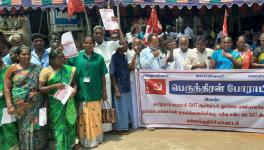A Cup of Tea, Luxury for Tea Plantation Workers in Tamil Nadu
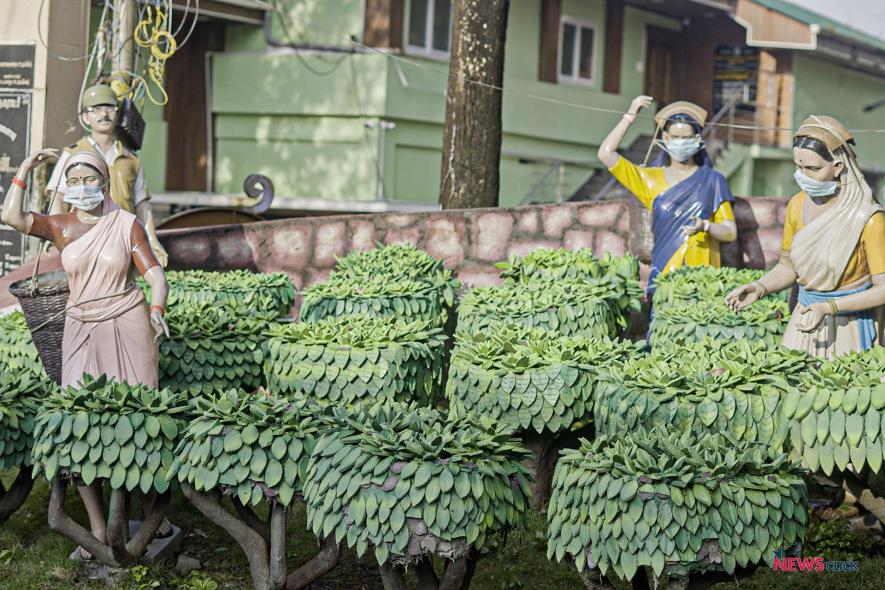
A portrayal of tea workers outside the Valparai Municipality office.
Tea is the most widely consumed beverage globally and in India, but those who produce it are denied a decent cup of tea to drink.
NewsClick recently visited tea plantations in and around the Valparai hill station in Coimbatore district, Tamil Nadu and engaged with the workers there. It turns out that the work conditions are so abysmal that the workers are quitting their work and migrating to the plains.
More than 20,000 workers are employed in the tea plantations within a 60 km radius. They are mostly second-and third-generation plantation workers born and brought up in the estates. They work from morning to evening plucking tea leaves, spraying pesticides, applying fertiliser and trimming the branches.
Workers stand on sloped terrain all day and work withstanding leech stings, which sucks out blood. The women workers use scissors for several hours at a stretch to cut tea leaves, which adversely impacts their health. Moreover, they are denied essential facilities such as toilets and safety equipment.
In many plantations, even the minimum wages, which the workers say is already insufficient, are not provided. Meanwhile, the tea sales were good during the pandemic because import from China was halted.
‘DENIED DECENT TEA’
As per protocol, each tea plantation worker must be provided with a cup of tea every working day. A person, who is usually a family member of a plantation worker, is appointed to brew tea in their residence. A worker collects and distributes the tea every afternoon.
NewsClick spoke to the tea maker in one of the plantations, who preferred to remain anonymous. She said, “Whether 20 people or 100 people, I am given the same quantity of ration to brew tea; you may understand how the tea would turn out.”
“The administration no longer provides me dish wash bars or tea strains. I have to purchase them with my income,” said the tea maker, who earns Rs 2,500 a month.
The workers complain that the tea is extremely watery and is just plain coloured sugar water.
Plantation worker Marimuthu said, “The tea we drink is brewed 2 km away from here, and by the time it is brought to us in the rain, it is no longer warm.”
The administration has not given a flask to transport the tea. The person who carries the tea runs the entire distance to ensure the tea reaches the workers before it turns cold.
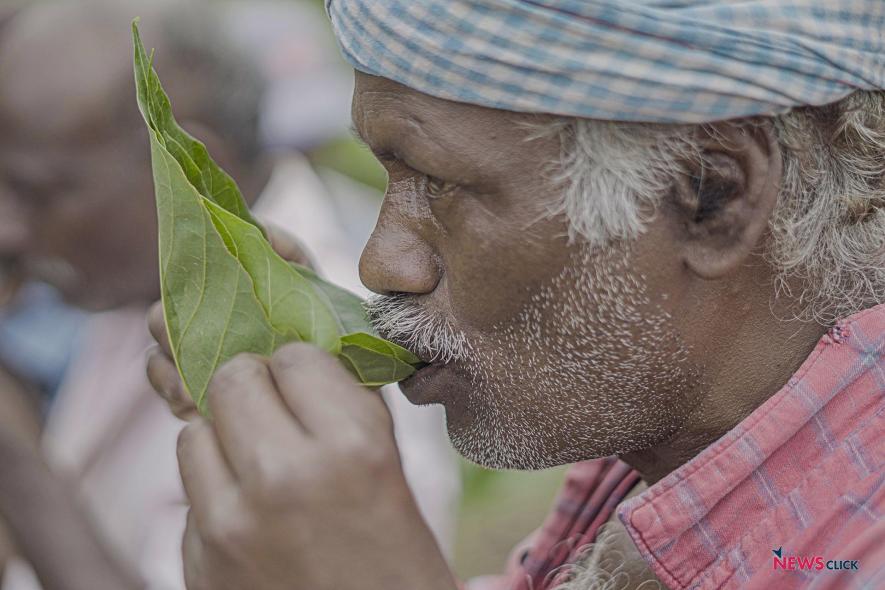
A worker sips tea from a leaf.
Moreover, the workers complain that the administration does not give tumblers or cups to drink the tea. They fold big leaves, pour their tea into it and sip it. When asked why the administration does so, one of the workers, Murthy, said, “If they give us these things, we will become dignified; they don’t want that for us.”
‘NOT COMPENSATED WELL’
The tea plantation workers earn around Rs 300/day. In most families, both the husband and the wife work in the plantations, and they say the income is insufficient to run the household.
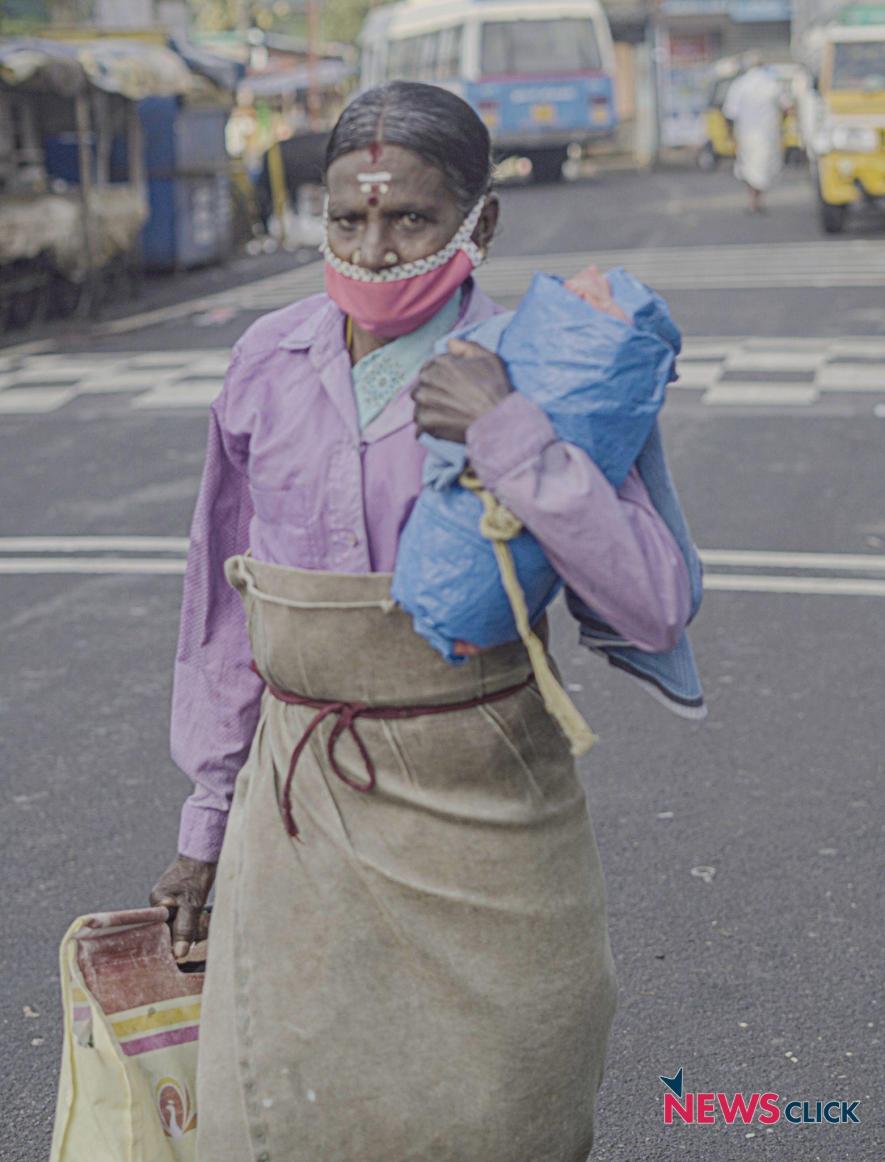
A tea plantation worker heads to work early in the morning.
“I have three children; they are studying at college. It is difficult to educate them with our meagre salaries. We take loans from the bank, pawn jewellery and borrow money to educate them,” said Murthy.
He further said, “Profit is aplenty in tea production as this is a cash crop. Tea yields and gives profits every day. During the pandemic, tea import was halted, so tea from here was sold for a good price. But we got no hike in pay nor bonus, but workers in neighbouring Kerala got a good festive bonus.”
Most private tea plantations are leased out to third parties in the region; very few are directly run by the owners. The management pays the owner their share, and the intermediaries keep the rest.
Murthy said, “They should ideally use the RFO fund to provide shoes and gloves for workers, but that is not spent on us. If we ask for it, they take revenge against us. They send out notices, and we are forced to prove our innocence through the trade union.”
“False cases are filed against those who oppose the administration. Such workers are often denied work and sent off to their native places,” said Paramasivan, CITU leader in Valparai.
“Tea was declared a food crop by the government during the pandemic, so we continued work during the lockdown. The Tehsildar and VAO announced ‘One Touch’, an order to work till 1 pm, but we were made to work till 3 pm and 4 pm. We had no option. We worked because we needed the income,” said Marimuthu.
Moreover, professional tax is levied on the workers. Each worker has to pay up to Rs 1,000/annum.
Madasami said, “During the Parliamentary election, we appealed to the DMK MP candidate to withdraw this tax. We said we are daily wage workers and our salaries are not sufficient. He promised to withdraw the tax but hasn’t shown up since.”
POOR HEALTHCARE AND SAFETY
It is mandatory for all large plantations to house health centres. The workers complain that the condition of these centres has deteriorated over the years.
Madasami, a second-generation plantation worker who joined work when he was 15 years old, said, “Back then, we used to pluck leaves with our hands. Only when the harvest was plenty, we would use scissors. These days we use scissors every day. This has led to ligament tears and bone thinning.”
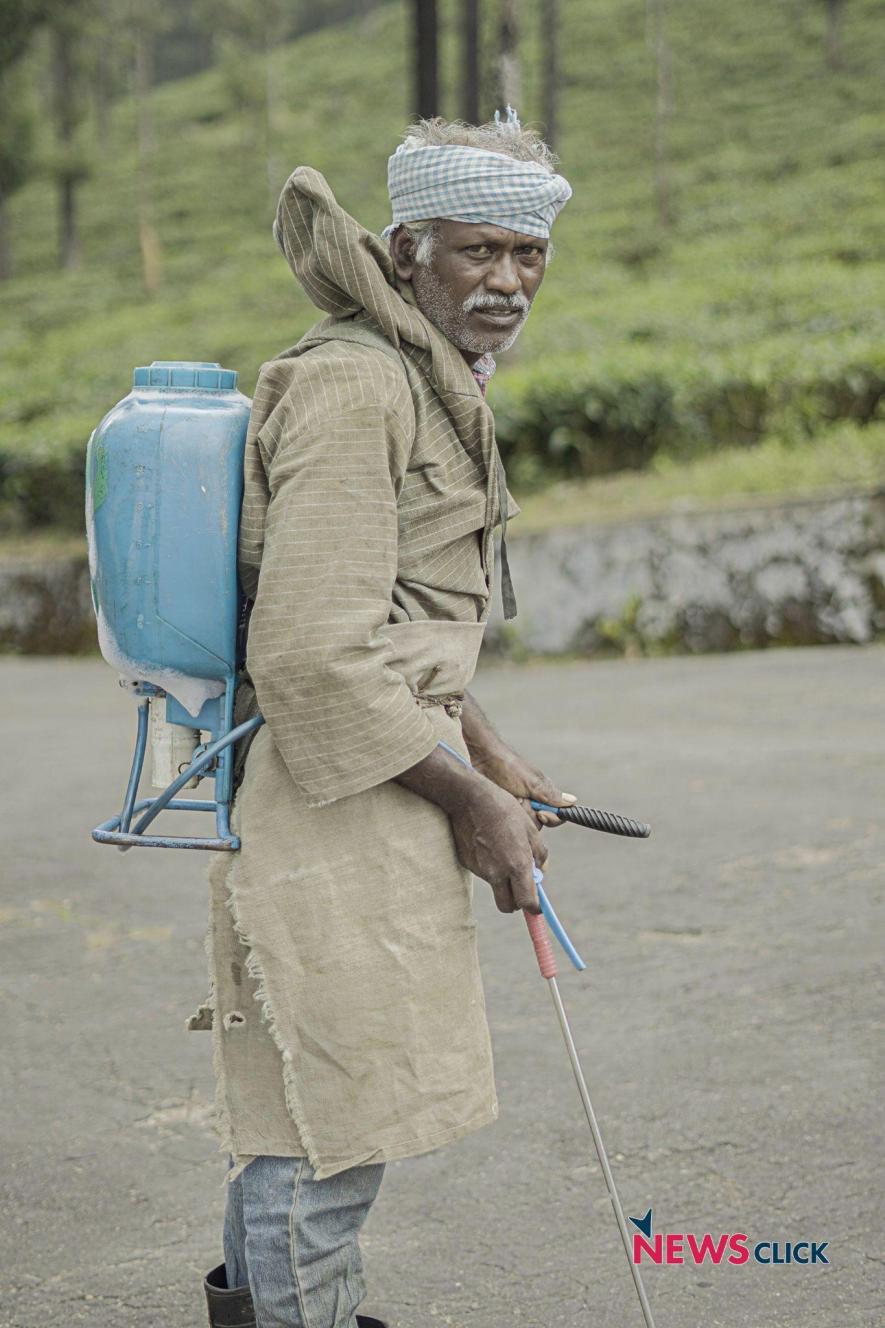
Madasami, a tea plantation worker, heading to spray pesticides.
He further said, “The company’s hospital ignores the problem. They only give us an injection and pain-relief balm and ask us to rest for two days. If the pain persists, we spend from our pockets, go down to Coimbatore and find out that the damage is severe.”
“When I was around 25-30 years of age, there used to be one male doctor, one female doctor, five ward boys and ten nurses. Now it has reduced. Recently, a person went to the hospital for chest pain. The only doctor was on leave. By the time they could take him downhill, he had passed away,” said Madasami.
Marimuihtu said, “In the Paradesi movie, the tea workers’ nerves were ripped off. They were merely fed water and coffee. Our situation is not much different; only our nerves are not ripped off, everything else is the same. We are meant to take what they give and continue work.”
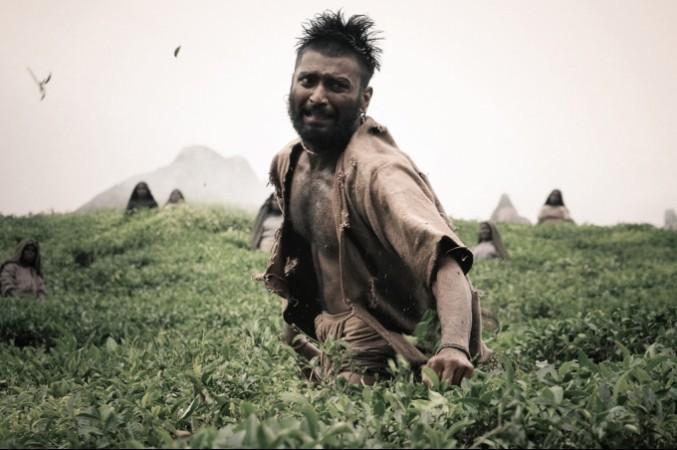
A still from Paradesi movie on the plight of tea plantation workers during British rule.
Another major problem that haunts tea plantation workers is attacks from wildlife.
“Leopards come all the way to the entrance of our residence, and they have even dragged away children. Elephants also show up in the evening and linger all night,” said Marimuthu.
Considering poor safety and limited facilities, plantation workers leave the hills and go off to the plains.
Paramasivan said, “Healthcare is poor, wildlife conflict has increased, residential facilities are limited, washrooms are not available, the drinking water connection is also not there… nothing is there. To save themselves, workers go to nearby cities like Kovai, Tiruppur, Erode, Salem to find daily wage work.”
He added, “Whether it is the labour welfare board or employees provident fund, they exist only in name-sake. The welfare board is responsible for workers moving out. If the board members carried out proper studies of the estates and provided rightful benefits, the workers would not have left. Everything was denied to them. That is why they left.”
Since the pandemic, there has been a spike in workers from other parts of the country. Workers from Assam, Orissa and Bihar are replacing the workers who have migrated out.
Get the latest reports & analysis with people's perspective on Protests, movements & deep analytical videos, discussions of the current affairs in your Telegram app. Subscribe to NewsClick's Telegram channel & get Real-Time updates on stories, as they get published on our website.

















